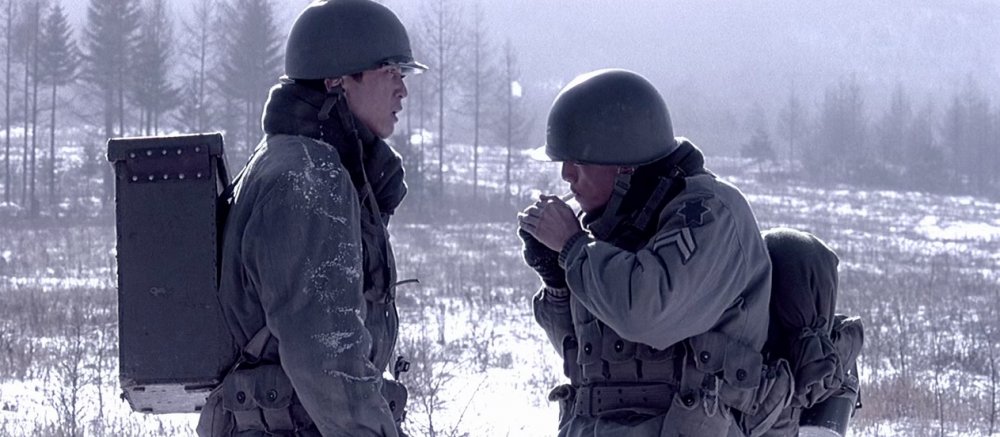By Chlotrudis Independent Film Society
Rating: 5 cats
Director: Xiaogang Feng
Starring: Fan Liao | Hanyu Zhang | Jun Hu | Yuan Wenkang

Original language title: Ji Jie Hao
Country: china, hong_kong
Year: 2008
Running time: 124
IMDB: http://www.imdb.com/title/tt0881200/
Jason says: “One probably wouldn’t name a war movie RETREAT!, although that’s what the assembly call of the film’s title means – fall back and regroup. There is, after all, a time for soldiers to be fierce and a time when doing so just means walking through a meat grinder.
“Captain Gu Zidi (Zhang Hanyu) knows this. A captain in Communist China’s army, the film opens in 1948 with him warning the Nationalist forces that they’re surrounded and it’s better for them to surrender than die fighting. He knows the position isn’t quite so one-sided, so he sends Lieutenant Jiao (Fan Liao) out for some more recon. They get pulled into battle anyway, and by the time it’s over, he’s lost a great many troops, including the unit’s political officer. And though his old friend Colonel Liu (Jun Hu) claims his next assignment is not a punishment, it certainly seems like one: He and his 46 men are to defend a coal mine – and the only new personnel he’s given is former prisoner Wang Jincun (Yuan Wenkang) to serve as the political officer (Liu says he doesn’t need one, but Gu’s men are nearly all illiterate, and having someone to write home for them would be a boon). The bugle call to assembly is supposed to come within a day, but while waiting, it’s a bloodbath. Afterward, to add insult to injury, Gu awakens in a POW hospital – he had taken an enemy uniform for warmth – unable to convince his captors of his actual identity. He stays in the army, though, assigned as an enlisted man to Zhao ‘Flapjack’ Er Dou (Deng Chao), hoping to learn the fate of his men.
“There are men for whom the military becomes their family, and Gu is one of those from the start of the movie. Interestingly, we see him follow the reverse of the usual soldier’s story arc: As the movie starts, he is the father figure, encouraging to his men and desperate to protect them even in death, adopting Jincun and making a man out of him. After the battle, we see him as a somewhat awkward recruit, not initially well-suited for the artillery unit he’s been assigned to, taken under someone else’s wing. He’s still the grizzled veteran in Zhao’s unit, though an NCO rather than an officer. For other characters, this may seem an affront to pride, but Gu seems content at his new place in the world. It’s the only one he really knows, and while he still clearly feels immense loyalty to his troops, there is perhaps a bit of relief in no longer feeling the burden of command.
“Zhang Hanyu plays Gu as aged beyond his years throughout the movie – it’s hard to believe Gu is only thirty-two as the film starts – and we respect the grizzled soldier almost instantly. He’s more likely to be sardonic than firy – indeed, when Gu yells, Zhang almost always makes the outburst seem like a sign of weakness, rather than something we should derive any satisfaction from. He’s ably supported by a number of pretty good actors – Deng as Er Dou, Yuan as initially-frightened political officer Jincun, and Yan Tang as Jincun’s wife – but it’s Zhang who is a nearly constant presence on the screen, and he owns nearly every scene he appears in.
“Aside, perhaps, from the battle scenes, where sheer bloody spectacle takes over. Director Feng Xiaogang is no stranger to large set pieces, as in previous films like BIG SHOT’S FUNERAL and THE BANQUET (inexplicably retitled LEGEND OF THE BLACK SCORPION for U.S. release), and these may be his best to date. They compare favorably to Steven Spielberg’s SAVING PRIVATE RYAN, filled with chaos and bodies being mutilated but still conveying what the individual soldiers are doing along with the scale and the odds of the battle. The colors are bled out by approaching winter, accenting not just what a dismal duty war is but some of the vibrancy of later recovery. Sound design is also excellent.
“It’s also interesting to see that Liu Heng’s script takes a certain amount of pains not to become propaganda, which is always worth paying attention to in films coming from authoritarian countries like mainland China. The soldiers don’t ever spout platitudes about the greater good they are fighting for, and the military bureaucracy often seems like a crueler foe for Gu than the Nationalists ever were (not a new theme for Liu; he wrote the screenplay for Zhang Yimou’s THE STORY OF QIU JU fifteen
years earlier). It’s the sort of statement Chinese film usually tries to make obliquely, ‘modern’ war films don’t seem to come out of China nearly as often as stories from the past – although part of that may just be that the politics wouldn’t appeal to the western audience.
“Politics don’t really enter into ASSEMBLY, though – it’s a great war movie because once boots hit the ground, the horrors and frustrations of war are fairly universal. 5 cats
“Seen 9 July 2008 at Concordia Theatre J.A. de Seve (Fantasia Festival)”
